Днес и утре
януари 9, 2012 — bridgesofgoodneighbourhoodThe project Bridges of good neighborhood is over
декември 28, 2011 — bridgesofgoodneighbourhoodOur work on the project Bridges of good neighborhood, whose purpose was to prevent illegal migration to and from Russia and CIS and promote legal one, is over .
For the period of the project (04.2009-12.2011) over back 100 people returned back to their country of origin. Most people returned to Russia, Dagestan, Armenia and Azerbaijan. They are mostly men. The average age of the returnees is about 30 years.
During 2010 and 2011, from Bulgaria, back to their country of origin returned 7 people, 2 persons to Armenia, 2 to Russia and 3 to Kyrgyzstan. Of these, 3 have received initial financial support of 250 €, and two € 2,000 to start their own business. The average age of the returnees is 42 years, 5 men and 2 women .
In total 16 people have turned for support to the Association For You, from these 3 persons were deported, 7 returned with the support of the project, 3 persons have changed their minds, while 3 could not leave the country due to lack of documents. The avarage time to organize the return is about 1 month.
The most common reason for leaving the country is inability to acquire legal residence status in Bulgaria. Another reason is the lack of professional realization .
More information can be found at http://www.foryoubg.org
We thank all our partners with whom we cooperate during the project. We hope to continue working together.
Проект мостове за добросъседство приключи
декември 28, 2011 — bridgesofgoodneighbourhoodПриключи работата ни по проект Мостове за добросъседство, чиято цел бе да предотврати нелегалната имиграция от и към Русия и ОНД и да стимулира легалната такава.
За периода на проекта (04.2009-12.2011) обратно към страната си на произход са се върнали над 110 души. Най-много хора се връщат в Русия, Дагестан, Армения и Азербайджан, като преобладават мъжете. Средната възраст на завърналите се е около 30г.
През 2010 и 2011 г. от България , обратно към страната си на произход са се върнали 7 човека- 2-ма в Армения, 2-ма в Русия и 3-ма в Киргизстан. От тях 3-ма са получили първоначална финансова помощ от 250 €, а двама 2000 € за стартиране на собствен бизнес. Средната възраст на завърналите се е 42г., мъжете са 5, а жените 2.
Общо 16 човека са се обърнали за подкрепа към сдружение ЗА ТЕБ, от тях 3-ма са депортирани, 7 са се завърнали с подкрепата на проекта, 3-ма са променили решението си, а 3-ма не могат да напуснат страната поради липса на документи. Средният период за организиране на връщанията е около 1 месец.
Най-честата причина за напускане на страната е невъзможност за придобиване на легален статут за пребиваване на територията на България. Друга изтъквана причина е и невъзможността за трудова реализация у нас.
Още информация за проекта можете да откриете на www.foryoubg.org.
Благодарим на всички наши партньори, с които си сътрудничехме по време на проекта. Надяваме се и занапред да продължим да работим заедно.
Арменец се връща обратно в родината
декември 20, 2011 — bridgesofgoodneighbourhoodР. Ч., мъж на 63 г. от Армения, обущар. Живее от 1995 в България заедно със семейството си. Има 3 деца, две от които с увреждания. Когато се свърза с нас, той нямаше придобит легален статут за пребиваване в страната и беше кандидат за хуманитарен статут.
Р. Ч. е направил вноска за апартамент в Ереван през 1985г. Поради дългото му отсъствие , държавата решава да препродаде апартамента на друго лице. И така г-н Ч трябва се върне обратно за да уреди този въпрос. Освен това през 2007 той е получил заповед от полицията да напусне страната и не го е сторил.
Р. Ч. получи еднопосочен билет за връщане , 250 Евро първоначална финансова помощ , подкрепа за намиране на работа и адвокат от организация Hope & Help в Ереван.
Не отдавна Р.Ч. получи 2000 евро финансова помощ за стартиране на малък бизнес – обущарско ателие . Той вече закупи машини и материали и започна работа.
Връщане в Kиргизстан
декември 20, 2011 — bridgesofgoodneighbourhoodР. и К. А. от Ош , Киргизстан – съпруг и съпруга , съответно на 58г. и 59г., имат 2 деца. Тя е учител по музика в детска градина, а той фотограф . В България цялото семейство са кандидати за бежански статут и убежище. .
Семейство А. идва в България след размириците в Ош (Юли 2010). Те кандидатстват за получаване на бежански статут към Национална Агенция за Бежанците. След 8-месечно чакане за решение по кандидатурата им, те са все още без легален статут и вече без никакви средства. Семейството не е успяло да намери работа в България. Това са и причините те да решат да се върнат обратно.
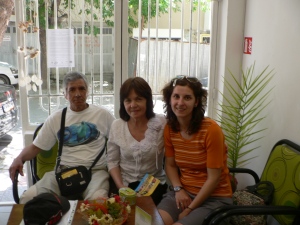
Р. и К. А. заедно с координатора на проекта, преди техния полет за дома, в офиса на Сдружение ЗА ТЕБ .
Р. и К. получиха самолетни билети до Ош. Два месеца по късно дъщеря им също се прибра у дома с помощта на проект „ Мостове за добросъседство”
След тяхното връщане К. А. получи финансова подкрепа от 2000 евро за стартиране на малък бизнес като фотограф . С тези средства той закупи фото-апарат, принтер и материали за ателието си .
Връщането на семейство А. бе организирано само за няколко дни .
Consultation and voluntary return of migrants in Bulgaria, on the example of Association FOR YOU.
ноември 29, 2011 — bridgesofgoodneighbourhoodThis report covers the period between April 2009-September 2011.
Overview Bulgaria
The total population of Bulgaria according to the census of 2011 is 7 364 570, from them the permanently residing migrants in Bulgaria are 36 723 (~0.5%). The people seeking protection since 1993 until July 2011 are 19 527 and the people seeking protection since January until July 2011 are 537. Refugee or humanitarian status since 1993 until July 2011 is granted to 6 054 people.
Russians in Bulgaria are traditionally well accepted and very good integrated in the society. In general the representatives of the Russian federation are well accepted by the society.
Interesting fact is that high number of migrants apply for protection just to be able to reside longer in the country. The procedure can take years.
Procedure of return in Association FOR YOU
Before return
- Contact with the migrant
- Filling questionnaire and business plan
- Collecting additional information, passports and papers, pictures
- Contacting Migration Police Department
- Checking means of transport to homeland
- Contacting partner at place of return and checking the available information
- Contacting coordinating organization
- Buying tickets and accompanying the migrant to the airport/bus station (if possible)
After the return the partner organization shall :
- establish contact with the returnee
- collect tickets
- meet him/her
- check his/her living and psychological condition , health and surrounding
- assess the business plan if any
- distribute financial aid if any
- make pictures
- provide advice and support
After the return of a migrant all involved organizations shall inform themselves periodically about his/her living situation.
The most common reasons for return are:
- Migrants have no legal status which allows them to stay in the country
- Economical reasons
The dificulties that Association FOR YOU is facing are :
- Most of the migrants live in Sofia
- Most of the actives actors in the field are situated in Sofia
- Migrants often need psychological and legal support
- The tickets to their homelands are very expensive
- Often there is no partner at place of return
- There is no good coordination between different institutions in the field
Bridges of good Neighborhood
ноември 29, 2011 — bridgesofgoodneighbourhoodOrganization AWO Arbeiterwohlfahrt GmbH, Bremerhaven and the fund to support social projects „Education Society“, Moscow launched the project „Bridges of good Neighborhood. „The goal of this project is to prevent illegal migration from Russia and in Russia, and to improve opportunities for legal migration. The basis for achieving this objective is to establish a network of Euro-Asian non-governmental organizations , developing and covering different aspects of the migration management. The European Community assists to this project under the program „Cooperation with third countries on migration and asylum”. The duration of the project „Bridges of good Neighborhood“ is from 01 April 2009 to 30 September, 2011.
The main task
The project should facilitate the strengthening of political dialogue on migration issues between the EU and NIS countries, to improve social services for migrants in their countries of origin and host countries, enhance the professional competence of the staff of NGOs and public authorities, to facilitate the provision of objective and impartial information on the topic of migration in the media.
Objectives
Within the project we plan to develop an international network of Euro-Asian non-governmental organizations and to develop a joint information strategy for immigrants to apply best practices in the management of social services, education and training of personnel of nongovernmental and governmental organizations
Target groups
The project is directed towards the following target groups: immigrants (legal and illegal) in Germany, Poland, Bulgaria, Russia and the NIS, returnees from EU countries to Russia and the NIS, employers, NGOs, officials and journalists. .
Events
The project is divided into the following modules, which include research, information exchange, social services and education:
-Researches. Study of Migration in Euro-Asian region, the impact of migration on the development of population, social systems, economy and regional development, analysis of the law for immigrants.
– Information portal „Promigrant“ (information on NGOs and their services for immigrants, immigrants’ rights, programs to assist in the return, news releases). Information portal „Promigrant“ is planned as a platform for bringing together NGOs from the EU, Russia and NIS countries operating in the field of migration. The profile of NGOs, their consulting services are available to immigrants, non-governmental organizations and other stakeholders. Potential employers will be able to publish the available jobs for immigrants. On the site wil be published “Compass for immigrants” and recent acts of legislation on migration in an accessible form. Alsothe latest media reports on migration and information platform for the project „Bridges of good Neighborhood“ – information on activities, expert meetings, topical studies, etc..
– Cooperation and assistance for return and integration support for:
200 returnees from the EU to Russia
60 returnees from the NIS in Russia (fellow)
40 returnees from Poland, Bulgaria, Germany to NIS countries
700 immigrants (legal and illegal) in Russia
Social services include assistance in return, integration measures in Russia and NIS countries, support for beginning entrepreneurs, support for immigration centers in Russia.
– Мeasures to integrate immigrants into Russia (assistance in finding employment, training), support of regional migration centers.
– Тraining staff of nongovernmental organizations and state institutions (practices, law enforcement, human rights, tolerance, anti-discrimination training).
– Workshops for journalists (to gather additional information on migration issues, to establish contacts with NGOs, to spread a positive image of immigrants and to combat xenophobia)
– Roundtables “ Forum on Migration”(representatives from politics, business, NGOs, journalists)
– Network meetings to share information, knowledge and experience.
Regular meetings, roundtables and workshops will be conducted to facilitate the exchange of experts, exchange of good practices and to strengthen political dialogue on migration issues.
Practical support for immigrants and returnees.
Immigrants have the opportunity through one of the partners in the network and internet portal „Promigrant“ to get advice about their specific needs. AWO Heimatgarten in Germany and migration centers in Russia, for example, NGO “Urals home” or fund “Tajikistan”, that perform social services for immigrants, help, when necessary, to arrange their return, provide support in finding work and legal advice. Immigrants have the opportunity to attend seminars to open their own business and if necessary to obtain retraining or to attend language courses. Within the project it is possible for immigrants to be granted one-time financial assistance payment of their traveling expenses, provide financial assistance to start their own business at the place where they were returned and payment of medical expenses.
Results
As a result of the project „Bridges of good Neighborhood“ – the project worked 30 months – we expect: Intensify cooperation within the 20 non-governmental organizations of the Euro-Asian network , 200 immigrants from the EU to Russia, 40 immigrants from the EU to the NIS countries , 700 workers (legal and illegal) from the NIS in Russia have received advice, social and financial assistance and, if necessary, have visited vocational training. Four regional migration centers in Russia are supported. Employees of NGOs, public authorities and journalists have been trained, best practices – methods of care, legal advice for immigrants were introduced. Information portal „Promigrant“ and publication of research will contribute to help immigrants and to analyse the current developments and trends of migration movements in the Euro-Asian space.
Partners:
The project is divided into three subnets:
– 1 – Russia
– 2 – European Union countries (Germany, Poland, Bulgaria)
– 3 – NIS: Ukraine , Moldova , Armenia , Georgia , Uzbekistan , Azerbaijan, Tajikistan etc.
Links:
www.return-bridges.eu ; www.promigrant.ru; www.foryoubg.org
Cooperation network within the project “Bridges of good neighborhood”
ноември 29, 2011 — bridgesofgoodneighbourhoodThis data is part of the Evaluation of the cooperation network built within the scope of the project “Bridges of good neighborhood”. The goal of this project is to prevent illegal migration from Russia and in Russia, and to improve opportunities for legal migration. The basis for achieving this objective is to establish a network of Euro-Asian non-governmental organizations , developing and covering different aspects of the migration management as research, information exchange, social services and education, and voluntary return.
„Bridges of good Neighborhood is launched by the organization AWO Heimatgarten , Bremerhaven and the Fund for supporting social projects „Education to the Society“, Moscow. Furthermore over 20 organizations from Europe, Russian federation and NIS countries cooperated within this project. The project is directed towards the following target groups: immigrants (legal and illegal) in Germany, Poland, Bulgaria, Russia and the NIS, returnees from EU countries to Russia and the NIS, employers, NGOs, officials and journalists. The European Community assists the project under the program „Cooperation with third countries on migration and asylum”. Its duration is from 01 April 2009 to 31 December, 2011.
Between February 2009 and November 2010, 112 of 120 counsel cases returned to their countries of origin. In this context it should be mentioned that the according counsel and return management activities are still going on. In total, 64 men (53.3%) and 56 women (46.7%) were counseled. Most of the cases were accompanied by the Heimatgarten offices in Breslau, Poland (37 people), Frankfurt (36 people) and Karlsruhe (22 people). 20.8% of the return cases came up for the Heimatgarten partners in Bonn, Berlin, Bremerhaven Mannheim/Hildesheim and Bulgaria. About a quarter of the remigrants returned to Russia (24.2%, or 29 people) or to Chechnya (25.8%, or 31 people), 15% (18 people) to Azerbaijan, 10,8% (13 people) to Armenia. The rest (ca.25%) is distributed among Belarus (2.5%), the republic of Dagestan (4.2%), Kazakhstan (5.0%), Moldova (0,8%) and the Ukraine (4.2%). 15 applications for existence foundations were made, 4 of which were approved.
The network cohesion of the involved organizations can be described as good to very good. There are only few isolated parties. The area with the most listed cooperation is the field of legal counsel, similar numbers occur in the field of gathering necessary documents, and search for residential space. The fewest coordination occurred in the context of searching for educational or care facilities and on the level of research and scientific accompany.
The cooperation with official institutions was assessed more negatively in many areas. The exact source of this dissatisfaction could not be traced on the base of the data at hand. The telephone interviews however indicated that here problems with individual officials occurred. In particular: The Russian consulate was criticized.
The scientific cooperation was assessed noticeably positive, which indicates a high degree of quality on the level of knowledge management.
Also noticeable was that most of the network partners abroad with the exception of the Polish partners, only rarely cooperate with German Heimatgarten partners, with the exception of the financial and research level. On the contrary, the German partners deem the cooperation with the partners abroad on all levels except the financial level a particularly important.
The network analysis shows that problems with the financing of organizations on location occur. Therefore, these organizations are strongly dependent of Heimatgarten. To establish a rigid structure, it should be tried to a more long term frame for the project, with the request to find financial backup from Russian sides as well.
In general, a manifold and fertile exchange of knowledge and information between the various network partners exists on all surveyed levels.
In the context of quality management, the survey shows that the specific tasks are realized by the majority of the partners. The vast majority of the interviewees checks on the reintegration process of the returnees under their care. This is implemented with various tools and approaches, most importantly personal phone contacts with the returnees and through Heimatgarten partners on location. However, it could be criticized that this check usually takes place within few months after the return, even though it is difficult to gain substantiated conclusions about the success of the reintegration.
Similarly positive results show in the context of searching for residential space and jobs in the target country. The majority of the cooperation partners use various ways to gather the information, most frequently through the contact to Heimatgarten partners on location. This indicates the high degree of connection and cohesion between the cooperation partners.
Almost all network partners also implement public relations. This creates a base for an intensification of the public dialogue about the topic of migration and the support of a neutral and objective news coverage of migration and migration-related topics in the media.
To put it in a nutshell, according to the statements of the interviewees in the phone interviews, the structure as a whole and the cooperation between the various network partners in Germany, Eastern Europe and the CIS countries work well. The network meetings and the personal engagement of many colleagues were described as particularly positive.
In singular cases, particular people and few official institutions (e.g. the Russian consulate) were criticized. The most difficulties occurred in context of dealing with official institutions of the Russian Federation (like the aforementioned consulate). Some of the interviewees also mentioned that the returnees have insufficient knowledge about the current situation in the target countries. Here it would be advisable to inform the returnees more accurately prior to their return. Booklets or similar publications however would be an unsuitable tool for this task due to the rapid changes in the relevant sectors. Thus, personal talks with the staff members on location or information seminars would be more appropriate.
More about the project : www.foryoubg.org ; www.bridgesofgoodneighbourhood.wordpress.com
The “Evaluation of AWO Heimatgarten in the framework of the cooperation network “Bridges of good neighborhood” is made by Prof. Dr. Michael Schönhuht, Dr. Markus Gamper, Mag.-Soz. Anet Sahakyan, Dipl.-Soz. Annette Stürmer with the support of AWO Heimatgarten and the Trier University and the financial assistance of the European community programme “Cooperation with third countries on migration and asylum”.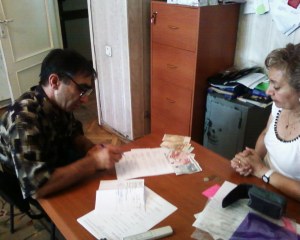
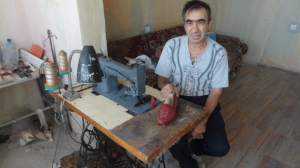
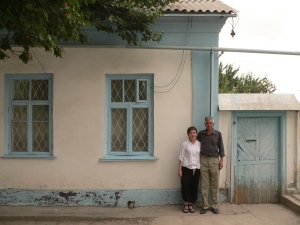






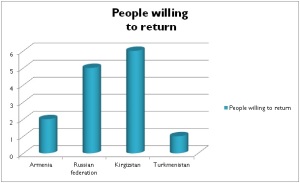

 Association 'FOR YOU'
Association 'FOR YOU'